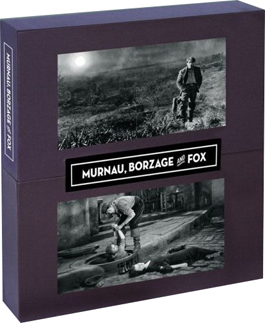home | metro silicon valley index | movies | current reviews | dvd review

Murnau, Borzage and Fox Box Set
12 discs; Twentieth Century Fox; $239.98
Reviewed by Michael S. Gant
Your humble reviewer has seen only some sample discs from this massive production, which collects two F.W. Murnau silents, and four silents and six early talkies by Frank Borzage, all made for the Fox studio. Certainly, any chance to see Murnau's gorgeous Sunrise (1927) is cause for celebration.
The tale of a hulking farmer (George Brent), his wisp of a wife (Janet Gaynor) and the siren (Mary Livingston) from the city who almost destroys their marriage is stripped to elemental emotions ornamented with the extraordinary visual marvels. On a trip to the big city, the Man and the Wife move through a great open square crisscrossed with pedestrians, cars and trolleys—all constructed on a set near Lake Arrowhead. With forced perspective and a variety of multilayered images, Murnau (with cinematographers Charles Rosher and Karl Strauss) conjures up a wonderful carnival scene powered by a frenetic jazz band whose players rise up like jack-in-the-boxes with the beat. Even the comic relief (a prissy barber and a drunken pig on the loose) seem forgivable in whirl of vivid sights.
The film also boasts one of the great tracking shots of all time. As the Man trudges through a miasmatic swamp, the camera follows behind, letting us stare at his hunched shoulders; seamlessly, the camera tracks alongside and then ahead of him, turning to give us a look at his face before pivoting in a thrilling pan to catch sight of the Woman From the City, lighting a cigarette and waiting for their tryst—at this ultimate moment we suddenly have the Man's POV before he moves into the frame for a passionate, guilty embrace. It bears watching again and again.
The real find of the set is Murnau's 1930 feature City Girl, which has been magnificently restored. Again, the city and country clash, as the naive son, Lem (Charles Farrell), of a stern farmer heads to Chicago to sell the wheat crop. At a bustling diner, he meets a lovely, thwarted waitress, Kate (Mary Duncan), who wants to get away to a more rustic life.
The city scenes, more realistic than the fantasy metropolis of Sunrise, are wonderfully drawn, with jovial customers jockeying for position at the diner counter and surreptitiously leering at the waitresses (when Duncan's Kate leans over to empty a pot, showing off her stockings, one man nudges another and quips, "It's better to be deaf than blind!").
A honeymoon trip to the old homestead pits Kate's modern ways with the patriarchal (in the biblical sense) stiffness of Lem's dad (David Torrence). A disastrous storm headed for the harvest leads to some poetic footage of threshing machines churning through the wheat stalks that surely must have influenced Terrence Malick when his made Days of Heaven. The film also includes several scenes dramatically lit by the harsh semicircles of light produced by lamps, in an uncanny anticipation of film noir techniques.
The remarkable Duncan (a real beauty who had a stage career before making a few films and retiring to the good life as the society wife of a rich business heir), also appears in Borzage's The River (1929), paired again with the hunky, aw-shucksing Farrell. The film, very much in the Murnau mold, has an innocent young fellow falling for a much wiser woman. Farrell plays Allen John Spender, who has dreams of floating his houseboat from the mountains to the sea. When he is stranded for the winter, he stumbles into the cabin of Rosalee (Duncan), the mistress of a mill owner who has been sent to prison.
Rosalee toys with John Allen at first, but eventually a genuine passion—both physical and almost spiritual—develops between them. Duncan exudes a luxe sexuality even in the far woods, lounging about her snowbound cabin in a succession of silk kimonos. In a scene that teeters between expressive and risible, John Allen works off his sexual frustration by stripping down to his T-shirt in a driving storm and vigorously chopping down half a forest full of trees.
The film exists only in fragments (mostly the long middle section, which is the best), but this restoration, bolstered by stills and explanatory text, brings us close to a major late silent feature, and for that cinephiles should be grateful.
The rest of this set includes some tantalizing frames from a lost Murnau production, 4 Devils, about a quartet of high-wire artists torn apart by another conniving vamp; the Borzage features Lazybones, Seventh Heaven, Street Angel, Lucky Star, They Had to See Paris, Liliom, Song O' My Heart, Bad Girl, After Tomorrow and Young America; a documentary about the two directors; and a book. The packaging of this behemoth (which can be found at a significantly discounted price ) has given rise to a lot of grousing on the Internet. With luck, maybe Fox can be persuaded to divide it up into more digestible and affordable single disc releases.
Click Here to Talk About Movies at Metro's New Blog
Send a letter to the editor about this story.
|
|
|
|
|
|